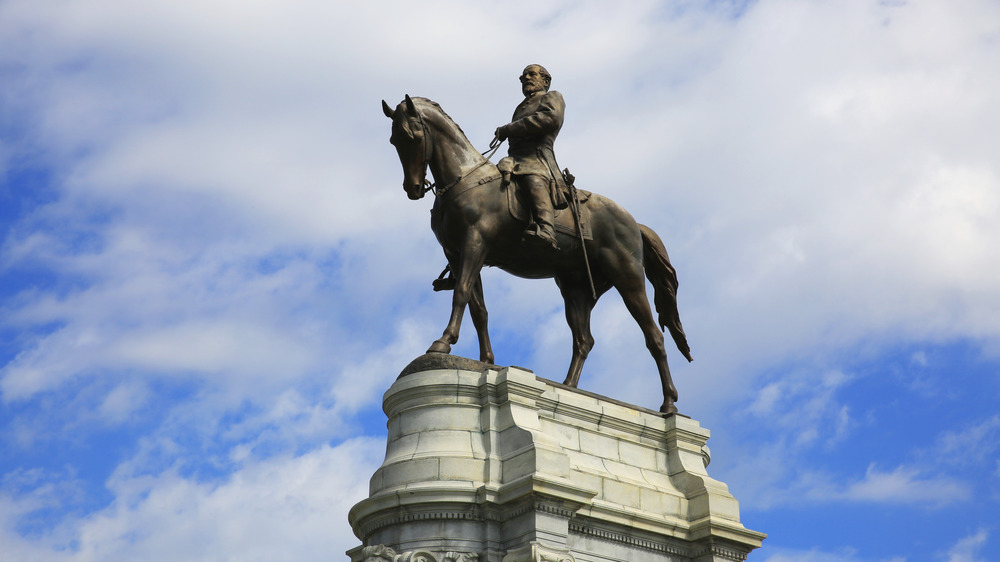The Messed Up History Of The Lost Cause Of The Confederacy
The Lost Cause of the Confederacy is not history. It's a pseudo-historical form of denial propagated by a bunch of traitors to the nation who didn't want to give up their slaves. In his Washington Post profile of one of the leading contemporary proponents of the Lost Cause, reporter Paul Duggan called the negationist narrative a "gauzy fiction ... which soft-pedals the atrocities of slavery and accentuates Confederate grievance and gallantry." Basically, it's what some have been telling themselves for over a century now to make themselves feel better about having ancestors who fought their own countrymen to keep their slaves.
Lost Cause believers will tell you the Civil War was fought over states' rights in the face of a tyrannical federal government. They'll tell you that the slaves didn't have it that bad, that they were actually treated pretty well by their owners, and that most of them didn't even want freedom anyway. "We're not claiming bad things never happened," Lost Cause proponent Frank Earnest told Duggan, "but it wasn't all whippings and killings, either." They'll tell you that equality must be given in bits and pieces, for some reason, putting the blame on the oppressed people's ability to handle that freedom and not the oppressor's reluctance to give it to them.
The origins of the Lost Cause narrative
In their book "The Myth of the Lost Cause and Civil War History," historians Gary W. Gallagher, Myra MacPherson, and Alan T. Nolan clearly delineate the divergent narratives of how the American Civil War has been remembered by subsequent generations. They write that the destruction of the South in the Civil War had to be explained by those who had brought it about, i.e., the leaders of the failed insurrection and those who followed them to that end. They cite a Confederate veteran who wrote, "If we cannot justify the South in the act of Secession, we will go down in History solely as a brave, impulsive but rash people who attempted in an illegal manner to overthrow the Union of our Country."
They trace the term "Lost Cause" back to 1867, to the publication of Virginia newspaper editor Edward A. Pollard's "The Lost Cause: The Standard Southern History of the War of the Confederates." Pollard was denying the root cause of the war as early as 1866, when he wrote that slavery "was in fact nothing more than a system of Negro servitude in the South ... one of the mildest and most beneficent systems of servitude in the world." And these views of the war, its causes, and the motives of the Southern states would endure in the 20th century, propping up the policies of white supremacy of the Jim Crow Era.
The Lost Cause and white supremacy are intrinsically linked
In his book "The False Cause: Fraud, Fabrication, and White Supremacy in Confederate Memory," historian Adam H. Domby writes that "at the turn of the twentieth century, a Lost Cause narrative celebrating white supremacy became a crucial rhetorical tool for white [southerners] in their efforts to justify segregation, disenfranchisement, and racial discrimination." And he adds that those narratives "not only continue to exist but still serve to perpetuate racial inequity." Testament to this is the plethora of Confederate statues that racial justice protesters want torn down.
In his profile of Frank Earnest, Duggan noted how the majority of them were put up at the beginning of the last century. But Earnest claimed that it wasn't white supremacy, but rather a lack of funding after the war that caused the flurry of statues to go up across the south. He said it took all the southern states 50 years to save up for some bronze statues. The Lost Cause narrative has been propagated in history textbooks across the south for generations. Mr. Earnest's eighth grade history book told him that the slaves weren't ready for freedom and claimed that the influential novel "Uncle Tom's Cabin" by abolitionist Harriet Beecher Stowe "gave a false picture" of the cruelty of slavery. Thus generations of southerners have grown up telling themselves that their forefathers were generally good ole boys who didn't have a racist bone in their bodies. History, however, does not reveal this to be the case.


